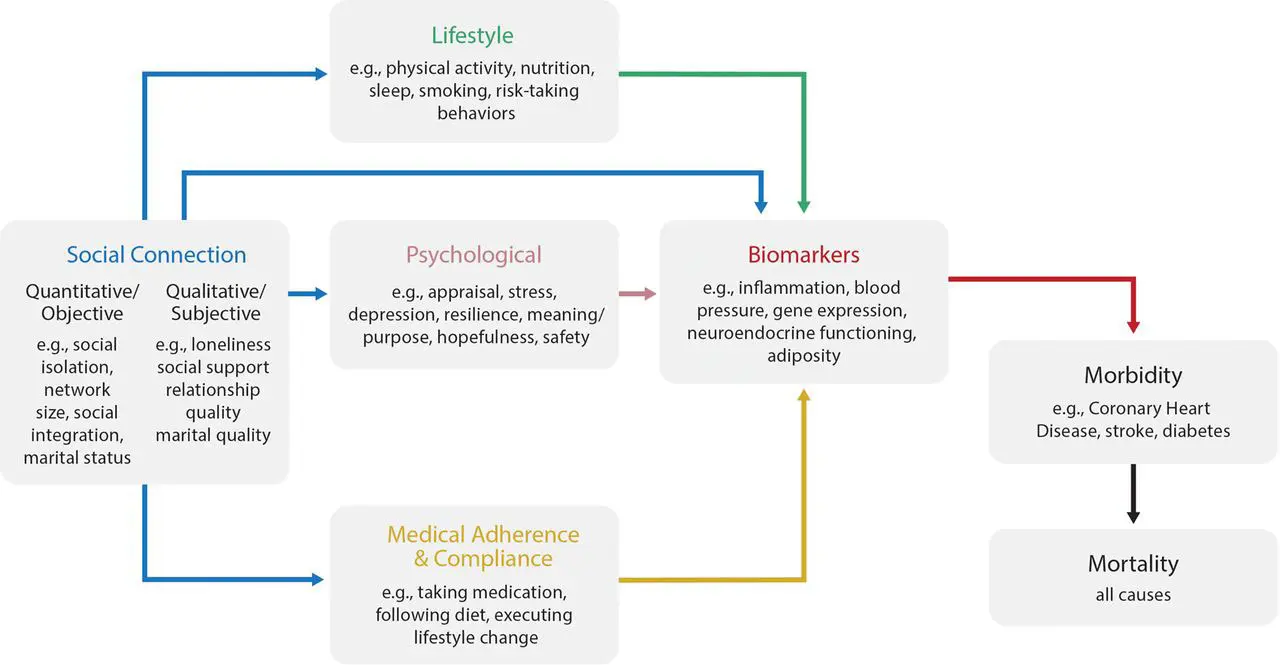Though we’ve never had more ways to connect, many studies suggest that people are getting lonelier, and that sense of loneliness is killing us.
“Loneliness has a much more complicated effect on mortality, but its effects are just as strong or only slightly less strong than obesity and smoking,” says Dr. Dhruv Khullar, a resident physician at Massachusetts General Hospital who has written about the impact that social isolation and loneliness has on his patients.
While there are many causes, ranging from the technology that’s replaced face-to-face communication to the deterioration of traditional community pillars, such as declining attendance at religious institutions and community centers, one major perpetrator might be the modern workplace.
“As people grow more isolated in their work, which comprises more than half of most people’s day, that is in many cases a missed opportunity to interact,” says Khullar. “Over time I think we will see negative effects of working remotely, working alone, working digitally, on people’s health.”
The Business Case For Addressing Loneliness
A recent report by the U.K.-based Campaign to End Loneliness predicts that social isolations costs U.K. employers £2.5 billion ($3.1 billion U.S.) per year in absenteeism, productivity losses, employee caregiving obligations, and turnover.
A recent meta-analysis that was published in the Perspectives on Psychological Science journal analyzed a series of studies of subjects over periods of seven years or more to determine the impacts of loneliness on their health. Researchers ultimately found that social isolation increases the risk of mortality by 29%, while living alone can increase the likelihood of death by 32%.
But it’s not necessarily the physical act of being alone that causes health complications as much as a general feeling of loneliness, which can fester in places that are well populated, like city streets and corporate office towers. That same study found that a subjective feeling of loneliness increased the subject’s likelihood of death by 26%.

The paper’s coauthor and professor of psychology at Brigham Young University, Timothy Smith, explains that loneliness isn’t itself a killer, but rather a gateway to a number of mental health problems, such as depression and anxiety, as well as physical health problems, such as inflammation, a weakened immune system, and insomnia.
“So you’ve got body chemistry that is affected by perceptions of loneliness, that then decreases organ function, which leads to decreases in health, and it becomes a negative spiral,” says Smith.
What Employers Can Do
While loneliness is emerging as a global epidemic, it is one that gives employers an opportunity to make a significant impact with minimal effort. And Sarah Ellen O’Farrell, a behavioral insights strategist for Hill+Knowlton, suggests that there’s a strong business case for employers as well.
She explains that employers looking to find the “root cause” to rising health care premiums as a result of issues like stress-related sick leave and cardiovascular health complications should consider social isolation and loneliness as a potential hidden culprit, and seek possible ways to facilitate more connections.
She points to one case study that followed call center staff after their employer switched from a staggered break schedule to one that allowed staff to take their breaks in groups.
“It’s a very simple intervention that has been shown to reduce turnover, increase health, increase productivity, increase loyalty; all because people have the chance to make connections when they otherwise wouldn’t,” she says. Other minor tweaks that can make a significant impact include facilitating regular communication and collaboration between staff members, encouraging more after-work group activities, and creating more time and space for employees to connect on the job with designated break and lunch rooms.
What Employees Can Do
When considering the proactive steps employees can take to mitigate the risks associated with social isolation, Smith suggests thinking about why it’s only becoming a problem now, and finding ways to turn back the clock.
“It used to be that there was greater relational permanency in society; you’d have smaller communities that knew each other, that interacted regularly, and those have become fragmented by modernization,” he says. “A level to start off with is to reemphasize permanent relationships across life.”
For example, Smith suggests that it’s never been easier to move to another job, another community, or another corner of the planet, but the convenience and flexibility afforded by modernity often fails to acknowledge the value of permanent relationships, something humanity has depended on throughout its existence.
On a more day-to-day basis, however, Smith says it’s important for people to be conscious of how much time they’ve spent alone, and consider taking proactive steps on days when they would otherwise have minimal human connection. He also emphasizes the value of approaching problems as a team.
“We’re very independent, we can easily adopt a mentality that if I don’t do it alone it’s not my work, but you need to acknowledge the synergistic effect people can have,” he says.
What Freelancers And Remote Workers Can Do
While it’s too early to show direct causal relationships, some researchers, including Smith and Khullar, fear that an increase in remote and freelance workers could lead to an increase in the health problems associated with loneliness and social isolation, but not everyone agrees.
“Though remote workers and freelancers work physically alone, there are so many ways they interact with people throughout the day,” says Brie Reynolds, a senior career specialist with FlexJobs who has been working remotely full-time since 2009. “Just because you’re alone doesn’t mean you’re not chatting on instant messenger or on message boards all day.”
Reynolds adds that it’s often up to those who employ remote and freelance workers to maintain regular communication, but freelancers can also take simple proactive steps to avoid the health risks associated with loneliness and social isolation.
“If you’re a remote worker or a freelancer, you can get together with a network of freelancers every week, or work from a coworking space,” she says. “Even just working from a coffee shop whenever you’re feeling stir crazy will help mitigate those health risks in the long run.”
Recognize your brand’s excellence by applying to this year’s Brands That Matter Awards before the early-rate deadline, May 3.
